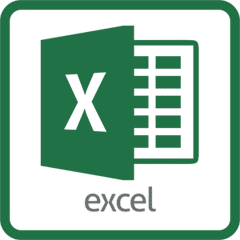Learn Excel Glossary Basics

If you’re new to Excel, it can be an overwhelming program with many facets, functionalities, and program-specific terms. The first step in utilizing the power of Excel is to gain a basic understanding of the main Excel functions and what they are called. Use this Digital Workshop Center Microsoft Office Excel Glossary and Terminology guide to get you started.
Some of the most basic, but important, terms to know and understand when using Microsoft Excel include:
- Workbook: A workbook in Excel refers to the entire file. You can have multiple pages, or sheets, in the workbook, but this term refers to the Excel document in its entirety.
- Worksheet: In your workbook, you can have multiple tabs or worksheets. It’s like having a notebook and each page is a worksheet, while the entire book is the workbook. Each worksheet can refer to different portions of your data and will be used to better organize information and separate things that do not need to be on the same page.
- Cell: A cell is a single square on the sheet, used to enter one piece of data. Cells are assigned an address based on the row number and column letter of its position. Cells are the building blocks of your spreadsheet and are used in the data calculations that help you manage your information.
- Row: In Excel, a row is defined as the horizontal data entry cells that make up the entire width of the document. They are numbered with row one located at the top of the sheet, going down to as many as 1 million rows below, depending on the version of your Excel program.
- Column: A column in Excel refers to the vertical data entry cells that make up the entire length of the document. Columns are assigned a unique letter combination and can span as many as 16,000 columns, depending on your version of Excel.
- Formula: In Excel, you can use a formula, or a mathematical calculation, based on how one cell, column, or row relates to another. Formulas are performed based on common mathematical operators including addition, subtraction, multiplication, and division. In Excel, you can utilize a formula on two or more cells to help you make sense of your data. Formulas are any mathematical function you do by hand in Excel.
- Functions: Functions also help you manipulate and understand your data, but are prewritten for you in the Excel program. Generally, they are more complex calculations that would take some time to set up, but instead, Excel has written the calculations for you and are available to you at your disposal. You can simply utilize these existing functions to help you manage your data more productively and efficiently. See a full list of Excel functions here.
Microsoft Excel is an incredibly robust program that’s designed to perform thousands of functions. This glossary is not comprehensive, but rather a snapshot of some of the most common features and terms used in the Microsoft Excel program. Looking for other terms or shortcuts not listed in this blog? See the full Microsoft Excel Glossary here.
An understanding of how Microsoft Excel functions is an extremely valuable skill to have as both a business owner or a job seeker. If you’re ready to learn more about Microsoft Excel and how it can improve your team’s efficiency or help you upskill your resume to land an administrative or office position, join us at the Digital Workshop Center. We offer in-person and online Excel classes in both Fort Collins and Denver, Colorado, for individuals and corporate teams. Our classes take you from the beginner Excel level all the way through to advanced functions and PivotTables to give you the skills you need to utilize Excel to its full potential. Click here to learn more about Excel Classes at the Digital Workshop Center and contact us today to get started!

